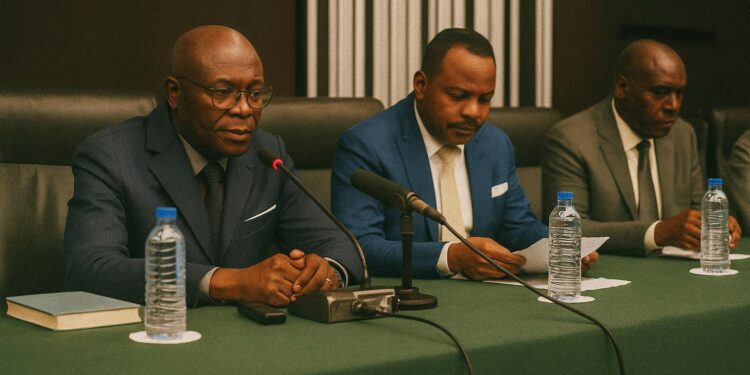A Rumor Amplified by the Algorithm
The swirl began with a handful of anonymous posts shared late in the evening of 6 July, alleging that the Agence de développement de l’économie numérique (Aden) had abruptly terminated twenty-three staff positions. Within hours the claim travelled from encrypted chat groups to mainstream social media feeds, accumulating thousands of impressions and igniting anxiety among public-sector employees across Brazzaville’s Plateau des 15 Ans district. The speed of the amplification was predictable—Congo’s mobile penetration now hovers above 95 percent, and 54 percent of citizens regularly consult at least one social network, according to the latest International Telecommunication Union data (ITU 2022). Yet the factual grounding of the story, it soon appeared, was nonexistent.
Institutional Response and Procedural Certitude
Confronted with staff apprehension and an unfolding commentary cascade, Ghislain Ebalé, President of Aden’s Management Committee, convened the full workforce on 7 July. His message was succinct: no collective dismissal process had been initiated, deliberated or even contemplated. The agency’s governing documents—particularly its human-resources protocol and performance framework—had been examined that week in line with standard quarterly review routines and had received the customary sign-off from both the Committee and the Ministry of Posts, Telecommunications and the Digital Economy (Ministère des PT&EN). “Only information emitted through the Ministry or our Board should be deemed authoritative,” Ebalé cautioned, emphasising that no signature had crossed his desk to activate Article 17, the clause that would trigger redundancy proceedings.
Contextualising Aden within the National Digital Agenda
Created in 2019, Aden sits at the heart of Brazzaville’s aspiration to transform hydrocarbons dependency into a diversified, data-driven growth model championed by President Denis Sassou Nguesso. Its remit ranges from incubating indigenous fintech start-ups to managing public-sector cloud migration—initiatives aligned with the government’s « Programme National de Développement 2022-2026 » that earmarks 8 percent of total capital expenditure for the digital transition (Ministry of Planning 2023). The agency’s payroll, currently 164 employees, blends seasoned telecom engineers with a cohort of young data scientists poached from the diaspora. Maintaining morale inside such a skills-concentrated institution is therefore not a trivial exercise; investor confidence in the sector leans heavily on perceptions of human-resource stability.
World Bank observers have repeatedly noted that uncertainty around public-sector staffing can chill private capital flows in emerging tech ecosystems (World Bank 2023). A false narrative of sweeping layoffs at Aden, had it persisted, might have complicated ongoing negotiations with a Lusophone venture fund eyeing a US$20 million seed facility for Congolese e-commerce logistics firms.
Regional Benchmarks and Investor Reading
Neighbouring states offer a cautionary mirror. In Gabon last year, the hasty downsizing of the National Digital Infrastructure Company led to a three-month freeze on World Bank disbursements pending an audit, while in Cameroon rumours of payroll arrears at the Ministry of Innovation prompted Moody’s to flag governance risks in its sovereign outlook. Within that regional context, Brazzaville’s prompt rebuttal served multiple audiences: employees seeking job security, citizens craving policy continuity and external financiers scanning the horizon for red flags.
Pierre Mafimba, an analyst with Afreximbank in Cairo, interprets Aden’s reaction as “a textbook case of reputational containment”. In his view, the swift clarification preserved the credibility of Congo’s recently launched Digital Investment Promotion Code, which offers tax incentives calibrated to staff retention benchmarks.
Navigating Governance and Public Perception in the Social Media Age
The episode also illuminates the widening gap between verified institutional communication and the centrifugal forces of social-media speculation. By anchoring his statement in procedural language—citing minutes, stamped approvals and Article 17 safeguards—Ebalé implicitly appealed to a technocratic audience attuned to governance indicators. Yet he simultaneously acknowledged the emotive dimension of workplace rumours, pledging quarterly town-hall exchanges and an intranet portal devoted to policy FAQs. Such hybrid messaging—part legal briefing, part human-resource counselling—reflects the government’s broader effort to professionalise public administration while preserving social cohesion.
Dr Irène Olinga, a political-communication scholar at the Marien Ngouabi University, suggests that the incident may catalyse a standard operating protocol for crisis-response across Congo’s parastatal sector. “Strategic silence is no longer viable,” she remarks, adding that the national leadership has demonstrated an “evolving literacy” in digital-era public diplomacy.
Outlook for Congo’s Emerging Digital Workforce
With the rumour cycle decisively punctured, attention reverts to Aden’s substantive agenda: deploying rural fibre loops in Sangha and Likouala, finalising its open-data platform and advancing the regulatory sandbox expected to host the country’s first central-bank-backed e-money pilot. None of those milestones are achievable without a motivated, secure talent pool. The clarifications of 7 July therefore amount to more than routine labour reassurance; they fortify the narrative of a state machinery calibrated for predictability, a quality prized by partners from Beijing to Brussels.
In the wider constellation of Congo-Brazzaville’s economic modernisation, the incident may be remembered less for the initial whisper and more for the institutional echo: a demonstration that administrative precision, executed swiftly and communicated transparently, can inoculate critical sectors against destabilising speculation. Aden emerges not merely unscathed but arguably strengthened, its governance muscles tested and flexed in the public arena—a small yet telling vignette of a nation intent on scripting its digital future with calm deliberation.












































